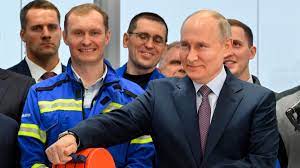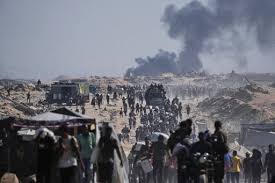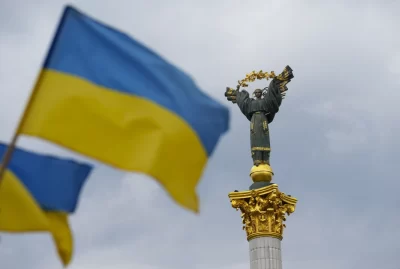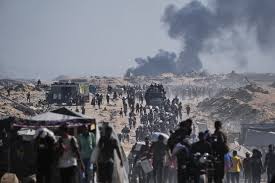
The United States said Thursday that it was sanctioning more than 150 businesses and people from Russia to Turkey, the United Arab Emirates and Georgia to try to crack down on evasion and deny the Kremlin access to technology, money and financial channels that fuel President Vladimir Putin’s war in Ukraine.
The sanctions package is one of the biggest by the State and Treasury departments and is the latest to target people and companies in countries, notably in NATO member Turkey, that sell Western technology to Russia that could be used to bolster its war effort.
The package also aims to hobble the development of Russia’s energy sector and future sources of cash, including Arctic natural gas projects, as well as mining and factories producing and repairing Russian weapons.
“The purpose of the action is to restrict Russia’s defense production capacity and to reduce the liquidity it has to pay for its war,” James O’Brien, head of the State Department’s Office of Sanctions Coordination, told The Associated Press.
The U.S. is sanctioning a newly established UAE company, which provides engineering and technology to Russia’s Arctic liquefied natural gas project, as well as multiple Russian companies involved in its development.
The U.S. package includes sanctions on several Turkish, Finnish and Russian companies that the State Department and Treasury say help Moscow source U.S. and European electronic components — such as computer chips and processors — which the U.S. says ended up in weapons used by Russia.
Treasury sanctioned what it called “a Finland-based network” that sent a wide range of electronics into Russia, including cameras for drones and lithium batteries. Finland is a European Union member that supports sanctions on Russia and the most recent to join NATO.
The State Department also is targeting Turkish companies that have provided ship repair services to a company affiliated with Russia’s Ministry of Defense.
Before the war, O’Brien said, Russia imported up to 90% of its electronics from countries that are part of the Group of 7 wealthy democracies, but sanctions have dropped that figure closer to 30%.
Sanctions, he said, “are effective” and “put a ceiling on Russia’s wartime production capacity.”
“Russia is trying to run a full production wartime economy, and it is extremely difficult to do that with secretive episodic purchases of small batches of equipment from different places around the world,” O’Brien said.
However, analysts say Russia still has significant financial reserves available and it’s possible for Russia to import the technology it seeks in tiny batches to maintain defense production.
“Russia could probably fill a large suitcase with enough electronic components to last for cruise missile production for a year,” said Richard Connolly, a specialist on Russia’s defense sector and economy at the risk analysis firm Oxford Analytica.
Russia also gets a lot of electronic components from Belarus, “so even if we whack all the moles, Belarus will still provide the equipment for as long as (President Alexander) Lukashenko is in power,” Connolly said.
Both Turkey and the UAE have condemned Russia’s invasion of Ukraine but have not joined Western sanctions and sought to maintain ties with Russia.
Russian Industry and Trade Minister Denis Manturov said this year that trade between Russia and the UAE grew by 68% to $9 billion in 2022, according to Russian state news agency Tass.
Still, the State Department believes sanctions are working, O’Brien said, noting that “the way to measure success is on the battlefield.”
“Ukraine can shoot down most of what the Russians are firing, and that tells us that there’s a gap,” he said. “The battlefield debris shows us Russia is using less capable electronics or sometimes no electronics at all.”
Nonetheless, Russia has been pummeling Ukraine with frequent missile attacks, including two over the past week that killed at least 23 people.
This is partly because Russia is “still getting hold of these electronic components and they are largely functioning as they did before,” said Connolly, the Russia analyst.
The latest sanctions package targets Russian companies that repair, develop and manufacture weapons, including the Kalibr cruise missile. But to really turn the screws, analysts say Western companies need to think twice before selling crucial technology to countries known to have a healthy resale market with Russia.
“We need to work much harder with companies in our own countries to ensure that they are not feeding the re-export market,” said Tom Keatinge, director of the Centre for Financial Crime and Security Studies at the Royal United Services Institute in London.




